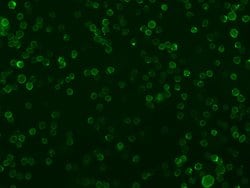Learn More
Invitrogen™ CD86 Recombinant Rabbit Monoclonal Antibody (103)
Rabbit Recombinant Monoclonal Antibody
Supplier: Invitrogen™ MA530196
Description
This product is preservative free. It is recommended to add sodium azide to avoid contamination (final concentration 0.05%-0.1%). Recombinant rabbit monoclonal antibodies are produced using in vitro expression systems. The expression systems are developed by cloning in the specific antibody DNA sequences from immunoreactive rabbits. Then, individual clones are screened to select the best candidates for production. The advantages of using recombinant rabbit monoclonal antibodies include: better specificity and sensitivity, lot-to-lot consistency, animal origin-free formulations, and broader immunoreactivity to diverse targets due to larger rabbit immune repertoire. This antibody has specificity for Human CD86/B7-2.
CD86, along with CD80, is a member of the B7 family of costimulatory molecules and plays a crucial role in T cell activation and immune response regulation. CD86 is expressed at low levels on B cells, macrophages, and dendritic cells, and its expression is upregulated on B cells through various stimuli, including the BCR complex, CD40, and certain cytokine receptors. As a type I membrane protein and member of the immunoglobulin superfamily, CD86 serves as a ligand for the T cell surface proteins CD28 and CTLA-4 (CD152). The interaction between CD86 and CD28 provides a costimulatory signal essential for T cell activation during antigen presentation, while binding with CTLA-4 negatively regulates T cell activation, diminishing the immune response. This interaction is critical for T-B cell crosstalk, T cell costimulation, autoantibody production, and Th2-mediated Ig production. The kinetics of CD86 upregulation upon stimulation suggest its significant contribution during the primary phase of an immune response. CD86 and CD80 have distinct roles in T helper cell differentiation, and insufficient co-stimulation involving these molecules can induce tolerance. Alternative splicing of CD86 results in two transcript variants encoding different isoforms, with additional variants described but not fully sequenced. Dysfunction in CD86 is associated with diseases such as gallbladder squamous cell carcinoma and myocarditis.
Specifications
| CD86 | |
| Recombinant Monoclonal | |
| 1 mg/mL | |
| PBS with no preservative | |
| P42081 | |
| CD86 | |
| Recombinant Human CD86/B7-2 Protein (Met1-His239). | |
| 100 μL | |
| Primary | |
| Human | |
| Antibody | |
| IgG |
| ELISA, Immunocytochemistry | |
| 103 | |
| Unconjugated | |
| CD86 | |
| activation B7-2 antigen; B lymphocyte activation antigen B72; B7; B7.2; B70; B7-2; B-lymphocyte activation antigen B7-2; BU63; CD28 antigen ligand 2; Cd28l2; CD28LG2; CD86; CD86 antigen; CD86 antigen (CD28 antigen ligand 2, B7-2 antigen); CD86 antigen precursor; CD86 molecule; CLS1; CTLA-4 counter-receptor B7.2; early T cell costimulatory molecule-1; early T-cell costimulatory molecule 1; Early T-cell co-stimulatory molecule 1; ETC-1; FUN-1; LAB72; Ly58; Ly-58; MB7; MB7-2; membrane glycoprotein; MGC34413; T-lymphocyte activation antigen CD86; TS/A-2 | |
| Rabbit | |
| Protein A | |
| RUO | |
| 942 | |
| Store at 4°C short term. For long term storage, store at -20°C, avoiding freeze/thaw cycles. | |
| Liquid |
Your input is important to us. Please complete this form to provide feedback related to the content on this product.
